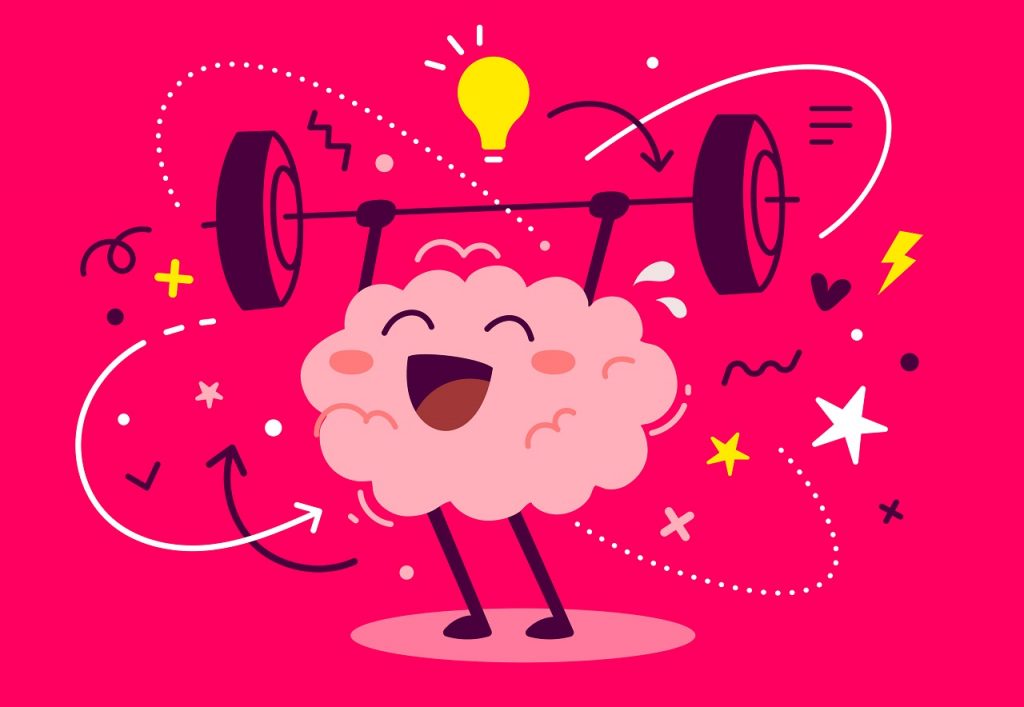
Exercise helps maintain healthy weight, control sugar levels, strengthen muscles and bones, and most importantly, it improves fitness and keeps you healthy! It also has an effect on our mental strength as it improves mood, helps in relaxation and lowers depression. This happens because the brain releases neurotransmitters called endorphins which regulate positive feelings and keeps the mood up.
What Is Good Mental Strength?
Having good mental strength means to have logical and realistic thinking patterns, decision making power and this helps manage your emotions and behaviour. Many studies have proven that people suffering with anxiety, mood disorders and depression benefit from including exercise in their routine. Hence, following a regular exercise pattern is essential to maintain mental health and improve mental strength.
Mental strength is as important as physical strength and the good news is that both can be improved with exercise. Hitting the gym or going for a run helps people suffering from heartbreak, loss of a loved one, less self confidence, as after training they report feeling good and positive by investing their energy in a positive place.
How Does Exercise Help?
Aerobic exercises like running, cycling, swimming are well known to reduce symptoms related to mental disturbances like stress and anxiety. Regular aerobic exercise improves blood flow to the brain and helps to strengthen brain health and memory. The increase in core temperature during aerobic exercise results in calmer mood after the activity. Aerobic activity even for 20mins a day results in positive mood and thoughts throughout the day.
How Does Weightlifting Help Build Mental Strength?
Weight training uses weights or external resistance for exercising. It is used to train and strengthen muscles, improve posture and bone structure, boost metabolism and help in better sleep. Lesser known benefits about lifting weights includes improvement in mind-muscle coordination which is an essential part of exercise. This coordination is associated with cognitive function of executive functioning which manages our command and control skills. Lifting weights also improves memory and cognition related tasks. It results in a realistic pattern of thinking, taking smart decisions and regulating behaviour. It also provides a sense of self efficacy and boosts confidence.
Resistance training is a highly effective way to manage symptoms of anxiety and depression. Because what benefits the body, benefits the brain. Just like lifting weights causes muscle gain, the brain has the capacity to change itself in response to internal as well as external influences, which is known as neuroplasticity. In the presence of weight lifting, the brain becomes active, hormone production and neuron production increases. All of this together improves mental strength and helps the individual recover from anxiety or depression along with the therapy.
Weight lifting teaches you to live in the present and be more mindful as lifting requires a lot of concentration and attention in the moment. Setting up the correct posture, controlling the body and performing the movement requires a lot of focus and concentration. Make sure to club weight training in your routine for a strong body and stronger mental health.
How To Get Started With Weight Lifting
- Aim to weight train for 30-45 mins, 3 times a week
- Start with low weights and focus on posture and consistency
- Train at low to moderate intensity for maximum benefit from weight training
- Do not miss out on 7-8 hours of sleep, meditation and a balanced diet which contributes majorly to staying fit
Even if you’re currently not depressed or anxious or have any goals of muscle building, I would urge you to consider weight training for all of it’s added benefit. We hope this article on lifting weights to build mental strength helps you. You can read more fitness related articles here. For tips from experts, subscribe for GOQii’s Personalised Health Coaching.
#BeTheForce


 If you have already browsed through countless articles on the internet before taking your first step towards weightlifting, then there might be a lot of questions on your mind. More so, because of the contradicting and confusing nature of the content you get online. The most common one being that you need a gym membership for weightlifting.
If you have already browsed through countless articles on the internet before taking your first step towards weightlifting, then there might be a lot of questions on your mind. More so, because of the contradicting and confusing nature of the content you get online. The most common one being that you need a gym membership for weightlifting.


